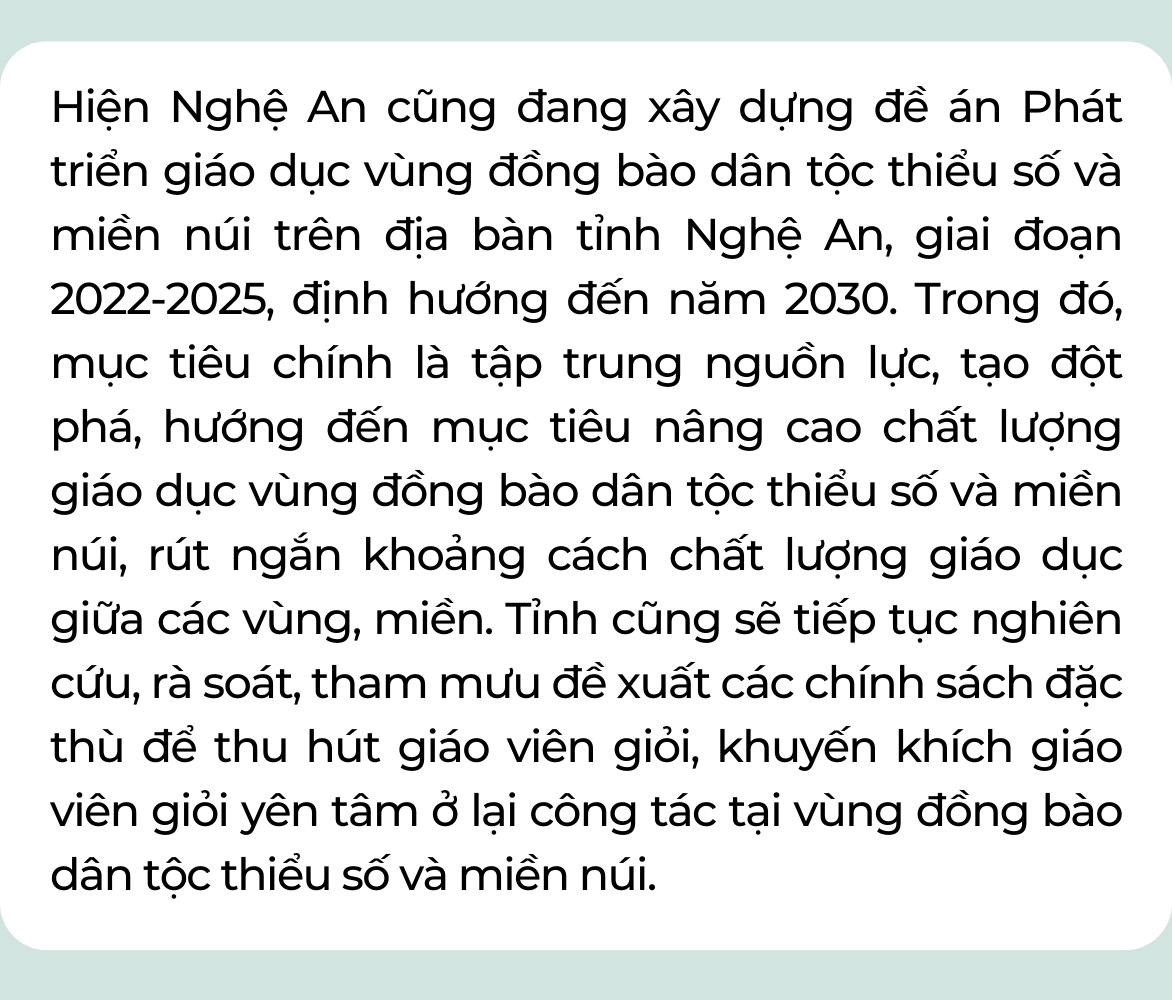
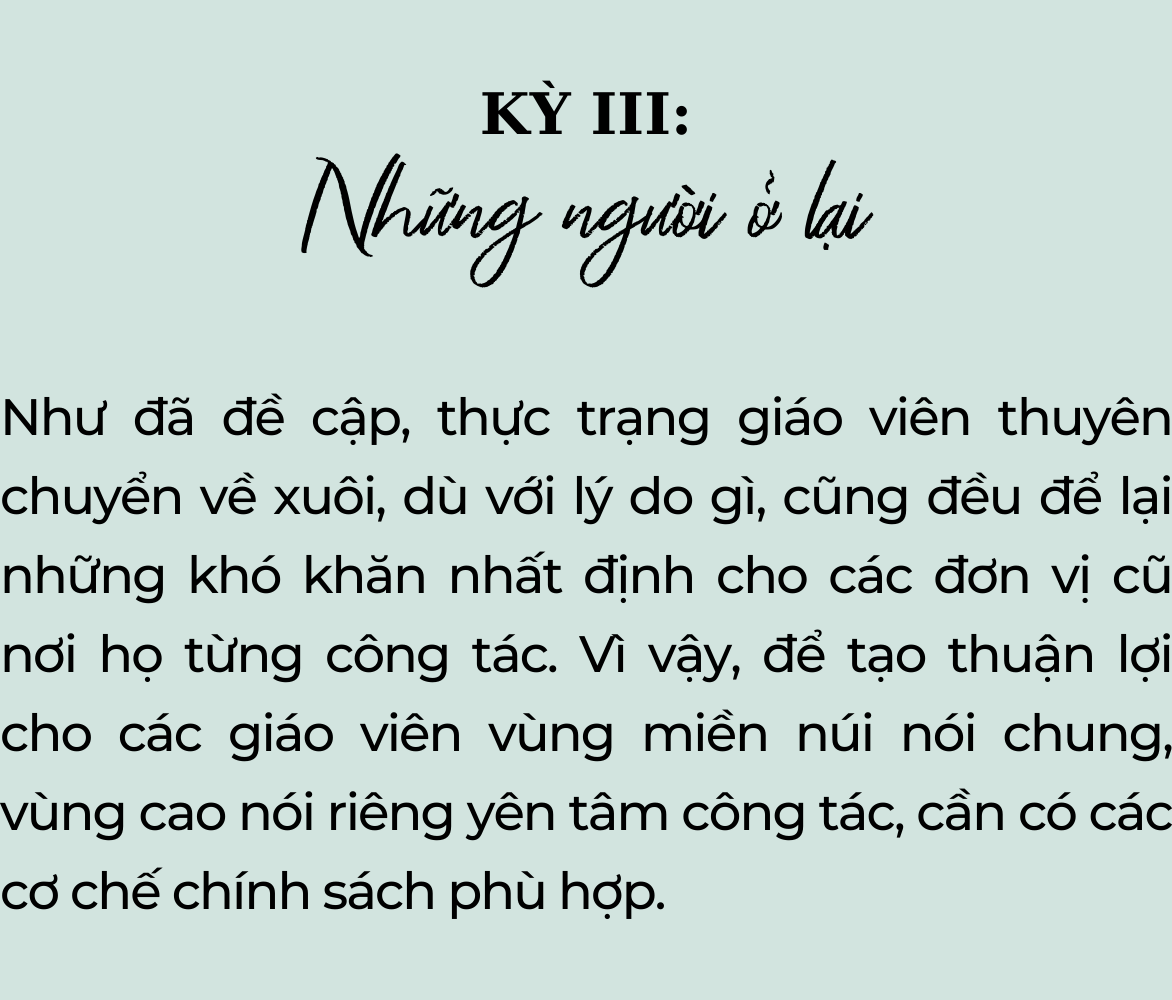

In 1987, teacher Phan Thi Huyen had just graduated from Nghe Tinh Pedagogical College. Holding a degree in Mathematics in her hand, she normally had many conditions to return to work in her hometown. However, at that time, her father was the principal, her mother was a teacher, so she encouraged her children to go to the highlands to work as "a conscript to be able to contribute to the highland districts"... She set off for Con Cuong district with the initial intention of going there for 2-3 years and then returning.
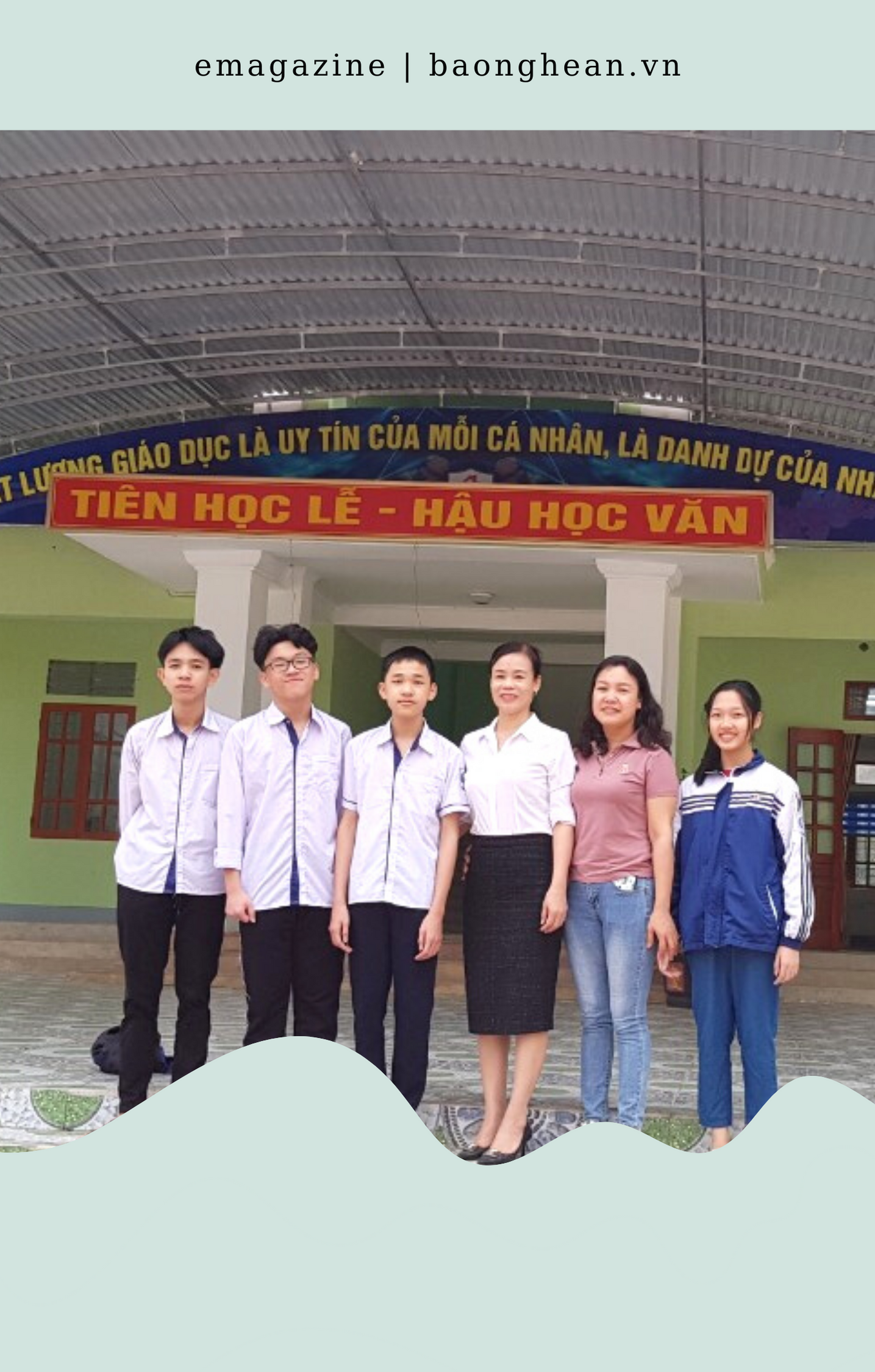
Yet, that “mountain-going” teaching trip has lasted until now, exactly 35 years, and in just a short time, teacher Phan Thi Huyen will retire according to the regime. Recalling the first days of working in Luc Da commune, one of the remote communes of Con Cuong district, according to teacher Huyen, it was “countless difficulties”. Moreover, teaching in the “deep forest and poisonous water” was also much different from the imagination of a female student of a teacher training college who was born in a favorable area: “Our school at that time was made of bamboo and thatch, each class sometimes had only 2-3 students and they were all ethnic minority students. To mobilize students to go to school, we had to go to each village to persuade them by all means to go to school…”, teacher Huyen said.
During those difficult days, teacher Huyen also “left for the lowlands several times”, but when she returned home, she missed her school and her students and had to take a bus back. During her time with Con Cuong students, she also realized the “very large” educational gap between students in the mountainous areas and those in the plains. That was also one of the reasons why she devoted so much effort to this land and persevered in the work of nurturing excellent students. Speaking more about this, teacher Phan Thi Huyen added: In the 90s, the provincial excellent student competition was divided into 3 groups and Con Cuong district was in group C – the mountainous districts. But then, the highest prize was only a consolation prize. The quality of teaching was indeed very limited.
Later, thanks to her ability, teacher Phan Thi Huyen was transferred to teach at a town school and then transferred to Tra Lan Secondary School - a key school of the district. At this new school, although the pressure on the quality of education was very high, with her solid expertise, dedication, devotion, and responsibility for her job, she was always trusted by the board of directors, colleagues, and parents. She herself also told herself to strive and try to improve her expertise and skills. Her achievements were also affirmed when at first, only a few students won the Encouragement Prize in Math, but now every year she seems to have excellent students in the province with many First and Second prizes. Students of Tra Lan School, there were years when they were in the top of the Math class - Phan Boi Chau High School for the Gifted, many generations of her students have now become teachers, engineers, doctors, some are currently teachers at specialized schools in the province.

Talking about her 35-year journey to teach in the highlands, Ms. Huyen also confided that she had no regrets even though only a few of her "volunteer" students from that year's class remain in Con Cuong. Only by going to the highlands and connecting with the local people, their parents, and the local government can she see the positive changes in this land. The most obvious of which is the change in awareness of learning and interest in education. Con Cuong is currently one of the bright spots in education in the highlands and has been in the top 3 of the province for many years in terms of both key achievements and general quality. That success is partly thanks to teachers who "go up the mountain" to teach like Ms. Phan Thi Huyen.
Teacher Pham Xuan Quang was born in Tru Son commune, Do Luong district. But since 1994, since graduating from the Mountainous Pedagogical School and being assigned to work in Que Phong district, Mr. Quang has been considered a local by parents and students here.

One of the main reasons is that teacher Pham Xuan Quang is currently one of the most veteran workers in Que Phong district. He can speak the Mong ethnic language like a native and has nearly 20 years of working at Tri Le 4 Primary School - a special school located in the most remote area of Que Phong district and has only male teachers. Talking about this, teacher Quang said: "Tri Le 4 School, located in Muong Long village, is where the Mong people live. To be able to teach the people here, I had to start learning the Mong language by writing down every word and every sentence in a small notebook and reading it over and over again. In addition to teaching, I was also assigned to carry out mass mobilization work. Because the Mong people have many unique customs. Therefore, in order for them to understand and share easily, we must have a way to approach and speak so that they understand and believe."
After many years of working, teacher Quang has also been trusted as a leader since 2001 and is now the Vice Principal of Tien Phong 4 School. Not only him, his family has also moved to Que Phong and settled down in this land with many hardships. Teacher Quang confided: To explain why I have been attached to this land for so long, it is because, when I came here to work, I got close to the people, so I gradually fell in love with the people here. In addition, I realized that with the efforts and dedication of myself and my colleagues, we have changed the people's awareness. The people here are literate, so they are more knowledgeable and from there, life is increasingly developed. The more I live with the people, the more they love and protect me, so I feel like this is my second homeland.
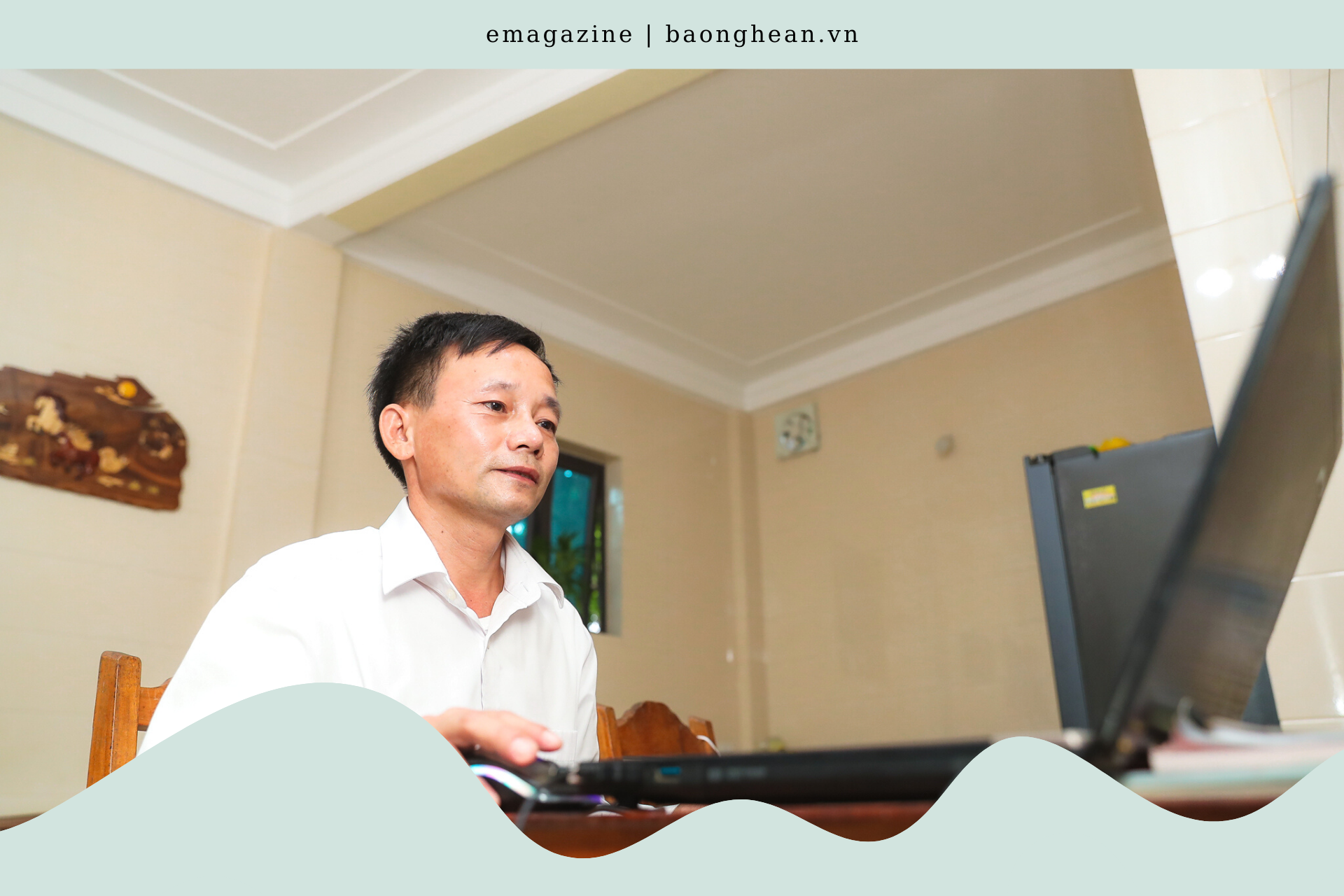

The transfer of teachers to the lowlands is explained by many different reasons. However, the number of teachers who stay and are willing to commit to the education career in the highlands is not small. To make teachers feel secure in their profession, within their capacity, the local government and the education sector have also tried to not disappoint teachers.
Looking back on 40 years of working in the highlands, teacher Nguyen The Hien (born in 1962) - Principal of Bac Ly Boarding Secondary School for Ethnic Minorities (Ky Son) summarized three "good" things. Among them, the biggest thing that moved and made him stay in this land was "the affection of the people, the parents of the students, the villagers": When we came here, there were times when we had no food to eat, no house to sleep in, the villagers took care of us in their house "with sticky rice, with rice" as if we were family - teacher Hien recalled.
Before that, in 1983, after graduating from the Faculty of Literature - Nghe Tinh Pedagogical College, teacher Hien was a student who volunteered to work at a school in the highlands of Ky Son. His decision at that time was told by the Deputy Head of the Personnel Organization Department of the Pedagogical College (who was from the same hometown as him, Thanh Chuong) that "no one like you has ever seen". His parents were very worried when their son went to the highlands because "Ky Son is very far away, son, it borders Laos". Eager to go to the highlands, teacher Hien did not understand the difficulties and hardships. He only knew that every time he went to Ky Son, he and his colleagues had to "pack rice and wait at Vinh bus station for 5 days for a bus to go to the school...

As one of the first batch of students to come to the mountainous district of Ky Son, teacher Hien has also witnessed the remarkable changes of this land. As for him, despite many difficulties, shortages and hardships, this is the land that helped him "sublimate" his career and was soon recognized by colleagues and local authorities: I worked for two years when the Department of Education and Training of Ky Son district organized a competition for excellent teachers of the district and I was encouraged to compete. My lectures that year were highly appreciated and I then continued to compete for the provincial competition for excellent teachers and became the first teacher of Ky Son district to achieve this title. In the third year of working, I was appointed as Vice Principal of the town's secondary school and 1 year later became Principal of Ta Ca secondary school. Among the newly graduated students that year, few students were appointed as principals so quickly.
After being appointed principal, teacher Hien had many other opportunities to develop such as working as an education department specialist, Chairman of the district's Trade Union, and then Deputy Chief of the District People's Committee Office. In the late 90s, he was even transferred to work at the Provincial Labor Federation. However, with his love for the profession and deep affection for education in the highlands, he returned and has remained there until now, becoming the most "veteran" principal of his district. 40 years away from home, his hometown, his wife and children, and now still living in a "collective house, group meals", but teacher Hien does not feel regretful because, as he said, "here I am taught to read and write, join forces with teammates and comrades, and witness the growth and progress of my students".

Ky Son is a mountainous district 30a, the most difficult and remote of Nghe An province. In recent years, for many different reasons (mainly because of family circumstances), many teachers have gone to the lowlands but many have stayed. Mr. Phan Van Thiet - Head of the Department of Education and Training of Ky Son district said: In the current conditions, having a separate policy for teachers to strengthen the highlands is beyond the regulations. However, in the local conditions, we always try to create the best conditions for teachers to develop their expertise, improve their lives such as transferring teachers to border areas, especially difficult areas to increase salaries, support money for special areas. Competent and professional teachers are sent to participate in competitions for excellent teachers, and are added to the core force of the provincial department. Currently, out of 82 schools in the district, about 65% of schools have teachers from the lowlands who are principals and vice principals in the schools.
To make teachers feel secure in their work, in recent years, teachers working in the highlands have received attention from localities such as properly and fully implementing policies, giving priority to recruiting civil servants, creating opportunities for teachers to study, improve their qualifications, and participate in provincial competitions for excellent teachers. Currently, most schools with teachers working in the highlands have public housing for teachers. Teachers with their own families, when working in remote areas, are given favorable conditions by local authorities to borrow land to build houses, and soon stabilize their lives. For many consecutive years, the Nghe An Education sector has honored teachers working in the highlands and many teachers have received the title of National Outstanding Teacher. In the list of excellent teachers, the list of teachers awarded the "Talent Development Fund" includes many teachers from highland districts.
In recent years, to shorten the gap between the highlands and the lowlands, many priority policies have been implemented for education in the highlands such as improving facilities and eliminating dilapidated bamboo and thatch schools. The whole province now has 55 semi-boarding schools for ethnic minorities and 8 boarding schools for ethnic minorities, which not only helps students but also teachers stabilize their teaching and learning, increasing their income.
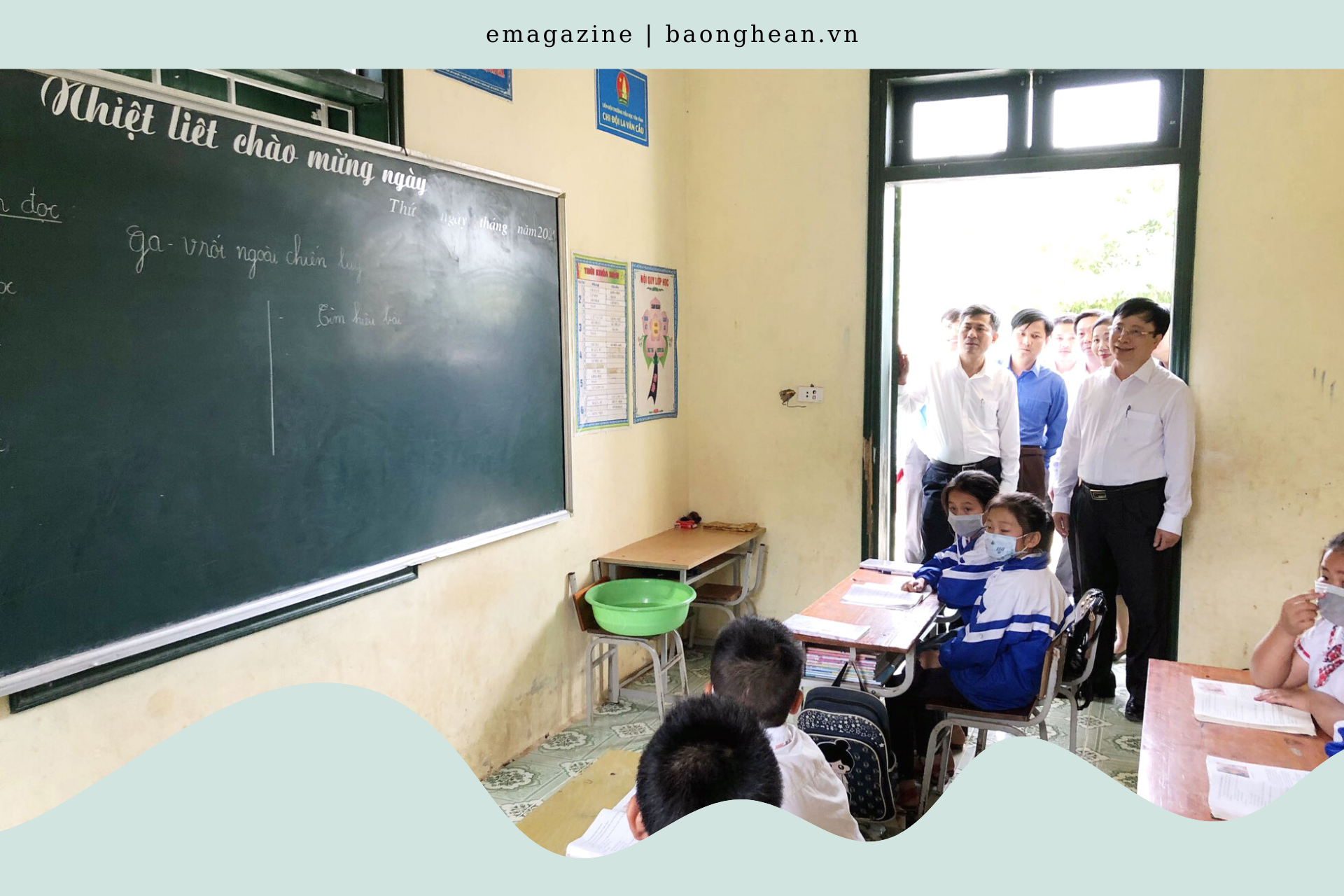
Giving his opinion on this issue, Mr. Nguyen Thanh Binh - Principal of Tien Phong Secondary School - Que Phong added: In order for teachers to feel secure in their work, the State must ensure good policies for teachers, especially teachers working in mountainous, remote, isolated and island areas. In addition, in the rotation work, it is necessary to pay attention to the wishes of teachers who have worked for a long time in remote and isolated areas to move to favorable areas. On the contrary, those who have been in favorable areas for a long time need to sympathize and share the difficulties with their colleagues; accept tasks in difficult areas to work.
